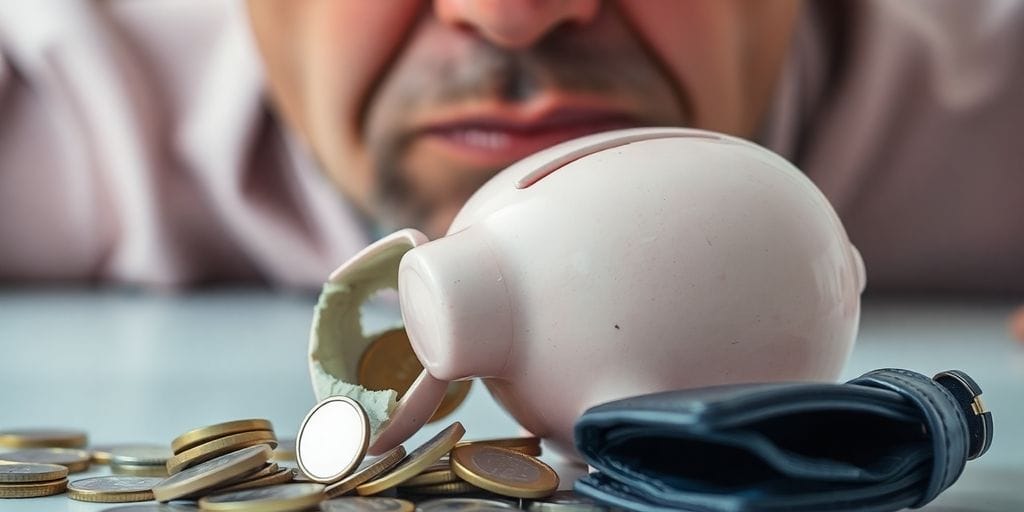So, you’re thinking about putting your money into Robinhood, or maybe you already have? It looks pretty simple and easy to use, right? Well, before you get too comfortable, it’s worth taking a closer look. While it might seem like a great way to get into investing, there are some real things to think about that could make Robinhood not so good for your money. We’re going to break down why Robinhood is bad for your portfolio, covering everything from how they do business to what happens when their systems go down.
Key Takeaways
- Robinhood has faced problems with regulators and fines, showing issues in how they operate.
- The platform’s design and limited options might push users toward risky moves and make it hard to spread out investments.
- Concerns about data security and how personal info is handled are important to consider.
- Technical issues and outages can mess up trading chances and make the platform unreliable.
- The way Robinhood markets itself can make investing seem like a game, which isn’t always good for new investors.
Questionable Business Practices: Why Robinhood Is Bad

Misleading Marketing Tactics
Robinhood gets a lot of flak for how they market themselves. Some people think it makes investing seem like a game. All those bright colors and push notifications? They can feel a lot like social media, which isn’t exactly what you want when you’re dealing with your money. This approach can trick people into thinking investing is super easy and always goes up, which, of course, isn’t true. It can lead to folks making snap decisions without really understanding what’s at stake. It’s almost like they’re trying to get you hooked on trading, instead of teaching you how to invest wisely for the long haul. This is especially risky for new investors who might not know any better. The Robinhood Lawsuit brought up some of these concerns, and it’s a reminder that users deserve to know exactly how their information is being used.
Ethical Considerations in Finance
There are some serious ethical questions that come up when you look at how Robinhood operates. Like, remember when they restricted trading on certain stocks during times of high market craziness? That really ticked a lot of people off. It felt unfair, and it made people lose trust in the platform. It also makes you wonder if individual investors are really on a level playing field with the big guys. And the way they handle customer support, especially during those critical times, also raises eyebrows. It’s not just about making money; it’s about doing it in a way that’s fair and open for everyone involved.
It’s unsettling to consider how much personal data we hand over to financial platforms. The expectation is that this information is protected and used responsibly, not as a tool for undisclosed business practices. When a company isn’t upfront about its data handling, it erodes trust and leaves users feeling vulnerable to potential misuse or breaches.
Ethical Considerations in Finance
There are some serious ethical questions that come up with Robinhood’s operations. For example, during times of high market volatility, they’ve restricted trading on certain stocks, which really upset a lot of users. This kind of action can feel unfair and can make people lose trust in the platform. It also brings up concerns about market manipulation and whether individual investors are truly on a level playing field with bigger institutions. The way they handle customer support, especially during these critical times, also raises eyebrows. It’s not just about making money; it’s about doing it in a way that’s fair and transparent for everyone involved. The Finra investigation into their practices has highlighted some of these issues, showing that regulators are also paying close attention to how they operate.
Regulatory Scrutiny and Fines: Why Robinhood Is Bad
It’s pretty obvious that Robinhood has been in hot water with regulators quite a bit. It feels like every other week there’s some news about them getting fined or investigated. This isn’t just bad publicity; it shows some real problems with how they run things and how they treat their customers. When a company is constantly being watched, it makes you wonder what else is going on behind closed doors.
Past Regulatory Violations
Robinhood’s history is full of regulatory violations, and it’s not a good look. They’ve been fined for all sorts of things, from misleading customers to system outages that stopped people from trading. These aren’t small mistakes; they often involve big money and point to ongoing problems within the company. For example, they got a huge fine from FINRA for issues with their options trading and for not being clear enough with customers. It’s like they’re always trying to catch up, fixing problems after they’ve already caused trouble. It makes you question if they really care about following the rules. FINRA penalties are no joke.
Here’s a quick look at some of the types of violations they’ve racked up:
- Not supervising customer accounts well enough.
- Misleading marketing and communication with users.
- System failures that led to trading problems.
- Problems with their anti-money laundering programs.
Investor Protection Concerns
All these regulatory issues naturally lead to big worries about investor protection. When a platform is repeatedly found to be breaking rules meant to protect investors, it hurts trust. It’s not just about losing money; it’s about feeling like the system is rigged against you. The whole point of these regulations is to make sure that regular investors aren’t being taken advantage of, and when a company like Robinhood keeps messing up, it raises red flags.
It’s a bit like trusting your money with someone who keeps getting speeding tickets. Sure, they might get you where you’re going, but there’s always that worry about whether they’re going to crash or get pulled over again. For your investments, that kind of uncertainty is just not something you want to deal with.
Future Legal Ramifications
So, what does all this mean for the future? Well, it’s not looking great for Robinhood. A history of regulatory problems often leads to more scrutiny later on. This could mean:
- Bigger fines and penalties in the future.
- Stricter rules imposed by regulators.
- Higher legal costs from ongoing investigations and lawsuits.
- A damaged reputation that makes it harder to attract and keep users.
It’s a cycle that’s hard to break, and it could seriously hurt their ability to grow and come up with new ideas. When you’re constantly fighting legal battles, it takes away from focusing on what really matters: providing a good, safe service for your customers.
Limited Investment Options: Why Robinhood Is Bad
Lack of Diversification Tools
Robinhood’s platform is easy to use, but it doesn’t give you many ways to spread your investments around. It’s not just about buying stocks; it’s about spreading your risk. If you want a strong portfolio that can handle different market situations, you might not find what you need on Robinhood. They mostly focus on individual stocks and ETFs, which is okay, but it leaves out other important ways to invest. For example, it can be hard to find investing with options on the platform.
Here are some common ways to diversify that are often missing or hard to use on Robinhood:
- Bonds (like corporate, municipal, and government bonds)
- Mutual Funds (especially ones managed by other companies)
- Real Estate Investment Trusts (REITs), beyond just basic ETFs
- Commodities (directly, not just through stocks)
Absence of Retirement Accounts
One big problem for people who want to invest for a long time is that Robinhood doesn’t have retirement accounts. You can’t get Individual Retirement Accounts (IRAs), either traditional or Roth, or 401(k) plans. This means you can invest, but you’re missing out on tax benefits that come with those accounts. If you’re serious about saving for retirement, this is a big issue. Other brokers offer a full set of retirement planning tools.
It’s a problem when a platform doesn’t have retirement accounts. It makes people look somewhere else for a key part of financial planning, which makes it harder to keep all your investments in one place. This can make taxes and managing your money harder.
Restricted Access to Advanced Instruments
If you want to do more than just buy and hold, Robinhood can feel limited. They let you trade options, but you can’t do as many complex things as you can with other brokers. Things like futures, forex, or even more complex options aren’t available. So, as you learn more about investing and want to try more advanced [investment apps], you might find Robinhood too basic.
Data Privacy and Security Concerns: Why Robinhood Is Bad

It’s easy to forget how much personal data we entrust to financial platforms. We expect this information to be guarded carefully and used responsibly. When a company isn’t upfront about its data handling, it erodes trust and leaves users feeling vulnerable.
Vulnerability to Cyberattacks
It’s a scary thought, but any platform holding your money and personal details is a target for bad actors. Robinhood, like any online service, faces constant threats from cyberattacks. If their systems get breached, your sensitive information could be exposed. Think about it: your name, address, social security number, and even your financial history could end up in the wrong hands. A major data breach could lead to identity theft or unauthorized access to investment accounts identity theft. It’s not just about losing money; it’s about the long-term headache of dealing with compromised personal data. They’ve had issues before, and it makes you wonder how robust their defenses really are.
Handling of Personal Information
When you sign up for a brokerage account, you hand over a ton of personal information. Robinhood collects all sorts of data about you, from your trading habits to your financial goals. The big question is, how are they using this information? Are they sharing it with third parties? Is it being anonymized, or can it be traced back to you? It’s not always clear, and that lack of transparency can be unsettling. You want to trust that your data is being handled with the utmost care and not just as another commodity to be leveraged. The more data they collect, the more responsibility they have to protect it, and sometimes it feels like that responsibility isn’t their top priority.
It’s unsettling to consider how much personal data we hand over to financial platforms. The expectation is that this information is protected and used responsibly, not as a tool for undisclosed business practices. When a company isn’t upfront about its data handling, it erodes trust and leaves users feeling vulnerable to potential misuse or breaches.
Encouraging Risky Behavior: Why Robinhood Is Bad
Robinhood gets a lot of flak, and some of it is because the platform seems to push people toward risky trading. It’s not just about making investing accessible; it’s about how they do it. The app’s design and lack of solid educational resources can lead users down a path they might not fully understand.
Gamified Trading Experience
Robinhood’s app feels more like a game than a serious investment tool. The bright colors, animations, and push notifications create a sense of excitement that can lead to impulsive decisions. It’s easy to get caught up in the moment and forget that real money is at stake. This gamification can be especially dangerous for new investors who don’t have a strong understanding of market risks. It’s like they’re trying to make trading addictive, not educational. The Robinhood Lawsuit brought up some of these concerns, and it’s a reminder that users deserve to know exactly how their information is being used.
Lack of Educational Resources
Robinhood doesn’t really offer much in the way of solid educational resources. Sure, they have some basic articles and FAQs, but it’s not enough to really teach people how to invest wisely. This lack of education can lead to people making uninformed decisions and taking on more risk than they can handle. It’s like giving someone a car without teaching them how to drive. They might get lucky for a while, but eventually, they’re going to crash. The way they handle customer support, especially during these critical times, also raises eyebrows. It’s not just about making money; it’s about doing it in a way that’s fair and transparent for everyone involved. The Finra investigation into their practices has highlighted some of these issues, showing that regulators are also paying close attention to how they operate.
It’s unsettling to consider how much personal data we hand over to financial platforms. The expectation is that this information is protected and used responsibly, not as a tool for undisclosed business practices. When a company isn’t upfront about its data handling, it erodes trust and leaves users feeling vulnerable to potential misuse or breaches.
Outages and Technical Glitches: Why Robinhood Is Bad
Robinhood’s had its share of tech problems, and these aren’t just small annoyances. When a trading platform goes down, it can have real effects on people trying to manage their money. It’s like trying to drive a car and the steering wheel suddenly stops working – you’re stuck, and maybe even in danger. It’s important to understand the impact on trading opportunities.
Impact on Trading Opportunities
Imagine you’re watching a stock, and it’s moving fast. You see a chance to buy or sell, but then the app freezes. These outages can mean missing out on big gains or, even worse, being unable to sell a stock that’s dropping fast, leading to significant losses. It’s not just about making money; it’s about protecting what you already have. When the platform isn’t working, your ability to react to market changes is completely gone. It’s a frustrating situation that can cost users a lot.
Unreliable Platform Performance
Every time Robinhood experiences an outage, it chips away at the trust users have in the platform. If you can’t rely on your brokerage to be available when you need it most, how can you feel confident putting your money there? It’s like having a bank that sometimes just closes its doors without warning. This unreliability makes people question whether Robinhood is a safe place for their investments.
When your investments are at stake, quick and effective support is not a luxury; it’s a necessity. The lack of accessible and responsive customer service during critical moments only adds to the stress and financial risk for users.
Here are some common complaints about their customer service during outages:
- Long wait times for phone support.
- Generic, unhelpful email responses.
- Difficulty reaching a human representative.
The Bottom Line on Robinhood
So, we’ve gone over a lot, right? It’s pretty clear that while Robinhood might seem like a good idea at first, especially with its easy-to-use app, there are some real downsides. Things like how they make their money, the outages, and even the way they push certain trades can really mess with your investments. It’s not just about saving a few bucks on commissions; it’s about whether your money is actually safe and if you’re getting a fair shake. Think about it: your financial future is a big deal, and picking the right platform matters a lot more than you might think. Maybe it’s time to look at other options that put your interests first, not just their own.
Frequently Asked Questions
How does Robinhood make money if it offers free trades?
Robinhood makes money in a few ways. They get paid by big trading companies to send your buy and sell orders to them. They also charge for special services, like Robinhood Gold, and earn money from the cash you keep in your account but aren’t investing.
What is ‘payment for order flow’ and why is it a problem?
This means Robinhood gets money from other companies when they send your stock orders to them. The issue is that sometimes, you might not get the absolute best price for your stocks because of this arrangement.
How does Robinhood’s app design encourage risky behavior?
Robinhood’s app is built to be super fun and engaging, almost like a game. This can make people trade more often and sometimes take bigger chances than they should, which isn’t always good for their money.
Has Robinhood experienced technical problems or outages?
Yes, Robinhood has had problems with its app crashing or not working right, especially when a lot of people are trading. These outages can stop users from buying or selling when they need to, which can lead to losing money.
What kind of regulatory problems has Robinhood faced?
Robinhood has been in trouble with financial rule-makers many times. They’ve been fined for things like not protecting customer accounts enough and for making it seem like options trading was safer than it really is.
What are the limitations of Robinhood’s investment options?
Robinhood mostly offers stocks, exchange-traded funds (ETFs), and options. They don’t have as many choices as some other brokers, like mutual funds or certain international investments, which can make it harder to spread out your money.










